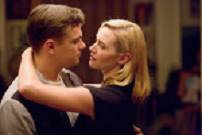|
|
||||
|
|
by Jeffrey Chen  Revolutionary Road appears at a time when, unfortunately, its subject matter has become well-explored in various media, including film. I'm referring to the subject of suburban discontent, the idea that the American dream of middle class comfort -- steady job, spouse and kids, a nice house amongst neighbors -- disguises vast personal turmoil underneath, of boredom and profound loneliness, where dreams are crushed by mind-numbing routine. These themes were more fresh when Richard Yates's acclaimed novel of the same name came out in 1961, when perhaps its delvings were revelatory of a shared national post-WWII sickness. But today this matter has become ripe, common fodder for many variations of adult stories. Ironically, one of the most visible recent movies dealing with this topic was Revolutionary Road director Sam Mendes's own American Beauty. That 1999 film put a big spotlight on the subject, bringing back to the public conscience the idea that suburbia is hell. Thus, Revolutionary Road feels like a repeat of sorts, as both movies cover the extreme idea of people trying to radically break out of mundane existences, but Beauty serves to handicap its younger sibling in several ways. It not only beats Road to the punch, thus dulling its effect by direct comparison, it also employed irony, thereby allowing it to use black humor to disarm its potentially weary audience. In that sense, Beauty's conscientiously formal style added to the effect, placing a layer of fantasy sheen over its ugly realities. Revolutionary Road plays it very straight, yet still formal -- it's so straight and formal there's no room to breathe. It goes from Point A to Point B directly, with Point B not only feeling expected but inevitable from the start. Take a look at how it begins: at a party, Frank (Leonardo DiCaprio) and April (Kate Winslet) spot each other in a subtle "meet cute," a youthful love story synthesizing before our eyes. Just as we finish watching them converse, the movie cuts to its main setting, the mid-1950s, where April has had a disastrous run acting in a local play, and, on the drive home, Frank isn't being very comforting. In fact, they get into a fight culminating with Frank pulling the car over and April subsequently storming out of it. At this point, we know exactly where the film is going, with the main question being, in what manner? I would dare describe the film as "freeze-dried." The production values of the movie are impeccable. The sets are beautiful renderings of the 50s period, and the costuming is exquisite -- perhaps too exquisite. DiCaprio and Winslet look like fashion models and appear easy on the eyes. Meanwhile, the acting also resists faulting, since after Titanic our two main stars here have individually grown into two of the best actors in the last decade. The movie lets 'em rip here with dialogue that sounds like the grand summation of every marriage argument that ever was, no holds barred. But all of this contributes to an inorganic feeling, one that's too neat, too efficient. Those marriage arguments follow familiar patterns, where Frank's male logic is countered by April's female emotional swings -- we can expect April to come up with the "mad" ideas because Frank is more cowardly and will always argue everything into a corner. There is truth in what we're seeing here, yes, but the path of the story is so linear -- it starts when April suggests they leave their lives in the U.S. behind and escape with their young children (who strangely don't seem to be around for most of the movie) to live in Paris, but after both of them are on board with the plan, steadily, surely, forces conspire to peel it apart. And when this marching sequence of events is dressed up in beautiful technical details, the whole thing starts to feel like a shiny museum exhibit. There's no wavering here, no chance to consider the complexities of the human decision-making potential -- we are literally watching two weak people self-destruct by the book. And if we didn't know we were doing that, the movie even features a character who will explain it all to us. Michael Shannon has a great little part as the once-institutionalized son of the family's real estate agent and none-too-deep friend (Kathy Bates, completing the Titanic reunion). He's the insane guy, which, of course, makes him the most sane guy in the movie, and in his main scene he spells out to the couple exactly what's wrong with them. It's an entertaining scene because Shannon pronounces what most of us in the audience have been thinking, giving us a vicarious thrill as he yells at the couple. By then, though, Revolutionary Road assuredly closes the door on its potential for surprise and deeper insight, and all we can do is effortlessly second-guess its inevitable conclusion. To paraphrase Bugs Bunny, "Well what did you expect in suburbia? A happy ending?" (Released by Paramount Vantage and and rated "R" for language and some sexual content/nudity.) Review also posted at www.windowtothemovies.com |
||
|
© 2026 - ReelTalk Movie Reviews Website designed by Dot Pitch Studios, LLC |



